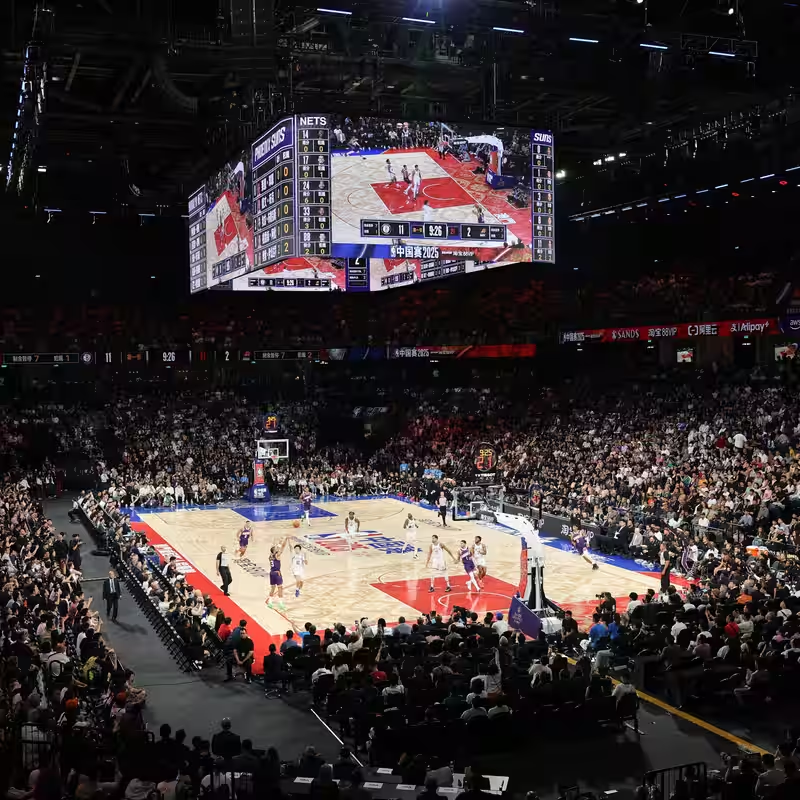
In a high-stakes game of global diplomacy, business, and basketball, few expected a casino giant to be the unlikely architect behind the NBA’s return to China. But according to a New York Times investigation, Las Vegas Sands—the gaming behemoth controlled by the Adelson family—played a pivotal, behind-the-scenes role in mending fences between the league and Beijing after years of icy relations.
The Backstory: NBA’s China Fallout
The rift began in 2019 when a tweet from Houston Rockets general manager Daryl Morey supporting Hong Kong protesters triggered a furious backlash from Chinese state media. The NBA was swiftly blacklisted: games disappeared from state TV, merchandise vanished from shelves, and billion-dollar partnerships froze overnight.
For years, the league treaded carefully, avoiding political statements while quietly seeking a path back into the world’s second-largest economy. But it wasn’t until Las Vegas Sands entered the picture that real progress began.
Why Las Vegas Sands? The Macau Connection
At the time, Las Vegas Sands was under intense pressure in Macau, China’s only legal gambling hub. With its casino licenses up for renewal and billions in revenue at stake, the company needed to demonstrate its value to Beijing beyond gaming.
Enter Rob Goldstein, CEO of Las Vegas Sands, and Patrick Dumont, the company’s president and son-in-law of the late Sheldon Adelson. Recognizing an opportunity, they leveraged their deep relationships with Chinese officials to propose a cultural olive branch: bringing the NBA back as a symbol of U.S.-China soft diplomacy.
“It wasn’t charity—it was strategic alignment,” said one source familiar with the talks. “Sands needed goodwill; the NBA needed access. China wanted a win-win narrative.”
The Deal That Changed the Game
Behind closed doors, Sands facilitated discreet meetings between NBA executives and Chinese regulators. They helped organize goodwill events, including youth basketball clinics in Macau and Shanghai, branded under NBA Cares but quietly funded by Sands’ corporate social responsibility arm.
Crucially, Sands also backed the Dumont Games—a new international youth sports initiative named after Patrick Dumont—that featured NBA legends and Chinese athletes. The event, held in Macau in early 2025, was broadcast across Chinese platforms and hailed by state media as a “bridge of friendship.”
| Milestone | Timeline | Key Player |
|---|---|---|
| NBA-China rift begins | October 2019 | Daryl Morey tweet |
| Sands begins outreach | Late 2023 | Patrick Dumont & Rob Goldstein |
| Dumont Games launch | March 2025 | Macau, China |
| NBA games return to CCTV | September 2025 | Chinese state media |
What This Means for Global Sports and Business
The NBA’s return isn’t just about basketball—it’s a case study in how private corporations can influence international relations when governments are at an impasse. Las Vegas Sands didn’t just protect its Macau interests; it became a de facto diplomat.
For the NBA, the reopening of China means renewed sponsorship deals, merchandise sales, and a massive fanbase eager to reconnect. For Beijing, it’s a PR victory that softens its global image without conceding political ground.
And for Las Vegas Sands? A masterstroke that secured its future in Macau—and proved that in the new era of geopolitical tension, sometimes the most powerful negotiators wear suits, not uniforms.




